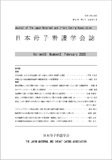Japanese
English
- 有料閲覧
- Abstract 文献概要
- 参考文献 Reference
要旨
目的
本研究の目的は、不妊女性における不妊治療に対する悩みと対処に影響する要因を明らかにすることである。
対象と方法
本研究は、計123項目の無記名式自己記入式質問紙法を用いた横断研究である。不妊治療受療中の女性750名を対象に質問紙を配布し、郵送法または留め置き法で回収した。質問紙は個人的背景、「不妊治療中の悩み尺度」、「悩みへの取り組み尺度」、「不妊治療を受けるカップルのパートナーシップ尺度」、「自己肯定感尺度」、「平等主義的性役割態度スケール短縮版」より構成した。分析には、差の検定、相関係数の算出、重回帰分析を用いた。
結果
有効回答数214名を研究対象とした。不妊女性は一般不妊治療期間が長いほど、「悩み」である「不妊であるがゆえの傷つきやすさ」、「妊娠に対する不確かさ」、「治療を続けていくうえでの夫婦関係」の得点が高く、「対処」である「不妊の経験から新しい価値を見いだす」の得点が高かった。胚移植回数が多いほど、「対処」である「内向的・感情的に対処する」の得点が高かった。
結論
不妊女性の悩みの軽減と対処行動を促進する支援を行うにあたり、一般不妊治療期間や胚移植回数を考慮していく必要がある。
Purpose:
To clarify the impact factors affecting anxiety and coping behavior in infertile women undergoing infertility treatment.
Methods:
This cross-sectional study used an anonymous, self-administrated questionnaire with a total of 123 questions. The questionnaire was distributed to 750 infertile women undergoing infertility treatment and it was collected from them by mail or placement method. The contents of the questionnaire included a personal background; previously developed scales of “Suffering during infertility treatment”, “Partnership scale for couples undergoing infertility treatment”, “Self-affirmation”; and a short version of “Egalitarian sex role attitudes”. The collected data were analyzed using significance tests, calculation of correlation coefficient, and multiple regression analysis.
Results:
Of the 750 infertile women contacted, 214 valid respondents were used for this study. The results showed that the longer the period women received treatment, the higher the scores of: “sense of vulnerability due to infertility”; “uncertainty toward pregnancy”; “partnership of couple undergoing infertility treatment” as “anxiety”; and “finding a new value from the infertility experience” as “coping behavior with anxiety”. The results also showed that the higher the frequency of embryo transplantation infertile women received, the higher the score on “introversive/emotional coping behavior” as “coping behavior with anxiety” resulted.
Conclusion:
The length of general infertility treatment administered, and the frequency of embryo transplantation are impact factors that cause anxiety and affect coping behavior in infertile women under infertility treatment. Therefore, the general infertility treatment length and embryo transplantation frequency should be considered to support to decrease anxiety and encourage coping behavior in infertile women under infertility treatment.
Copyright © 2020, The Japan Maternal and Infant Caring Association All rights reserved.


